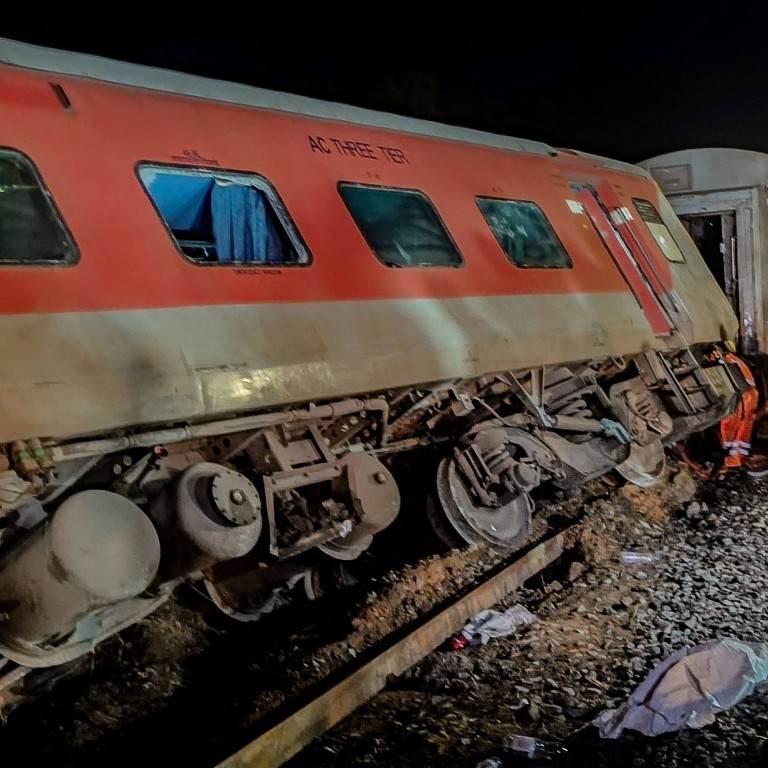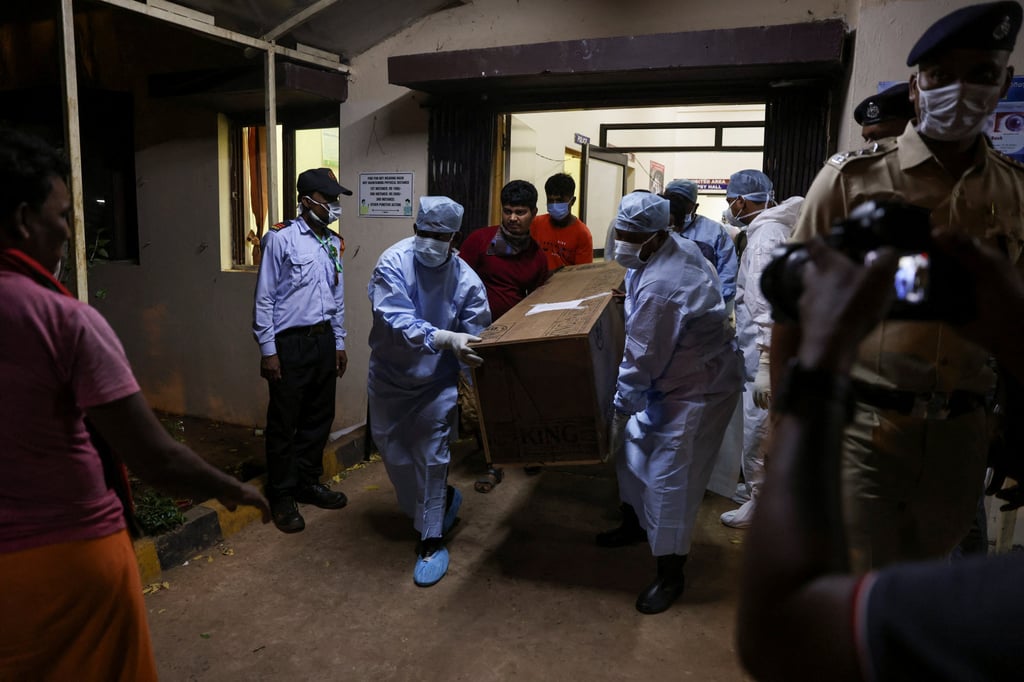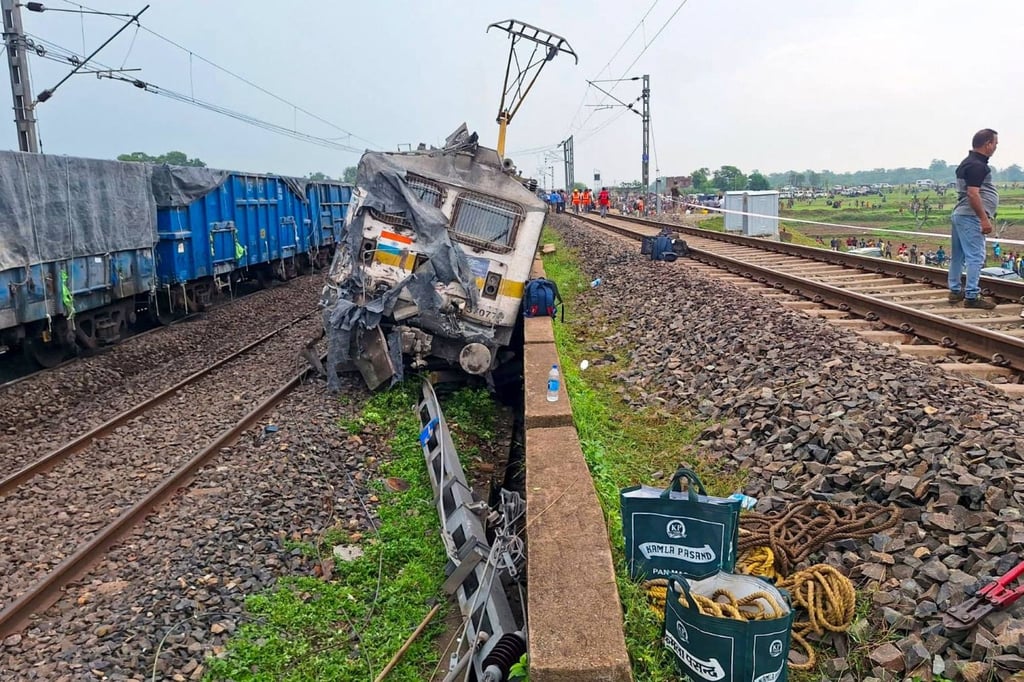
India’s ‘derailment minister’ slammed for fatal train accidents, years of track neglect
- The criticisms came after 10 train accidents happened in the past month and the deadly crash in June last year, which killed about 300
Eight train derailments occurred last month on different heavily used routes in northern India, with two more incidents reported earlier in August.
At least three people were killed and 30 others injured in these accidents, which also caused significant damage to railway infrastructure and embarrassment to the government.
“He [Ashwini Vaishnaw] is the ‘derailment minister’. How many trains have derailed in the last two years? In the last two months, four goods [freight trains] have derailed. He should have resigned, taking moral responsibility for about 300 deaths in the Balasore incident,” opposition leader Gaurav Gogoi told parliament on Friday.
Gogoi was referring to a tragedy in June last year when three trains collided in the Balasore district of the eastern state of Odisha, killing nearly 300 people and injuring 1,200 others, making it one of the deadliest train disasters in the country’s history.
“With so many accidents, people will stop travelling by train if this continues,” Sanatan Pandey, another opposition parliamentarian, said.
As the debate over the train accidents raged, railways minister Ashwini Vaishnaw pushed back against the opposition, saying the average number of derailments had not increased over the years but offered no explanation for the recent incidents.

Misplaced priorities
Indian Railways, which has a 174-year-old history, is the country’s largest employer with a 1.3 million-strong workforce. The country’s state-run vast train network, the fourth largest in the world, is the lifeblood of its transport system.
Railway experts have questioned policymakers following the latest accidents, saying it reflects the misplaced focus of the government of Indian Prime Minister Narendra Modi on the railway sector. They argue that the government is nowhere near its goal of introducing high-speed trains and other sophisticated rail systems, given that it has failed to bolster basic infrastructure such as reinforced tracks.
G Raghuram, a railways and infrastructure expert, said public perceptions of safety had been affected by the higher visibility of train accidents.
A thorough analysis of train systems should be carried out not just because of the series of accidents, Raghuram, a former director of the Indian Institute of Management Bangalore, told This Week in Asia.
“Being a large system like the railways, they must move to a heightened level of continuously reviewing and monitoring the systems. Go back to the drawing board by looking at design parameters and maintenance systems,” he said.
Though spending on railways has steadily increased over the years, most of it has been injected into newer and faster trains. For instance, spending on track renewal and maintenance fell from 15 per cent of total revenue in 2022-23 to a projected 10 per cent this year, based on official figures.

“The high-density corridors require a little more attention. Given the increasing traffic and weather are rapidly changing, the actual health [of the system] may be marginally behind what is required. We should be ahead, whether it is track, rolling stock, signalling, or overhead electrification,” Raghuram said.
Rail privatisation?
In December 2022, the Comptroller and Auditor General of India (CAG), the country’s top auditing body, published a detailed study on train derailments and found that scaling down maintenance costs was among the key causes.
Out of 1,129 derailments from 2017-18 to 2020-21, 289 derailments – or 26 per cent – were linked to track renewals, according to the CAG study.
“There was a decline in funds allotted for track renewals. The funds allocated to track renewal works were also not fully utilised. The decline in fund allocation and non-utilisation of allocated funds would have an adverse impact on the timely completion of track renewal works.”
With a total track length of over 125,000km, Indian Railways operates about 13,500 passenger trains and 9,100 freight trains every day. Indian trains carried over 6.8 billion passengers last year, compared with 8.4 billion in 2018-19 before the Covid-19 pandemic.
Passenger-carrying train journeys are heavily subsidised, and operational losses run into hundreds of billions of rupees, typically offset partially by freight traffic.

As freight trains and passenger coaches run on the same tracks, the infrastructure is over-utilised and regular maintenance is neglected, according to railway experts.
Srinand Jha, an expert on Indian Railways’ infrastructure, cited factors such as organisational mismanagement and misplaced priorities for the shortcomings in the sector.
“There has been confusion and directionlessness in the functioning of the organisation. Safety rules, procedures and drills are not being followed with the strictness required,” said Jha, the International Railway Journal’s regional editor for India.
“Each time an accident happens, focus shifts to technological solutions, such as the need to install the ‘Kavach’ [train protection system] or anti-collision devices. Such arguments are misplaced and can even be seen as diversionary tactics. Official safety records show that most train accidents have happened because of ‘derailments’ and other causes, such as signalling faults or fires in trains,” Jha said.
Analysts say the Modi administration’s strategic neglect of the railways could be an attempt to privatise the railways.
“Huge funds have been infused into Indian Railways since 2014, but the rate of return on investments has been negative. Some experts think Indian Railways is heading the same way as Air India,” Jha said, referring to the carrier’s privatisation in 2022.

